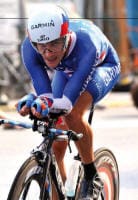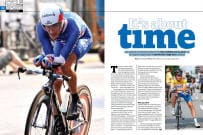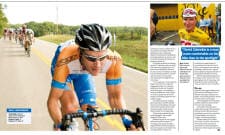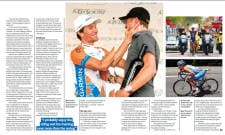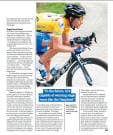It’s About Time: Dave Zabriskie has long been known for his time trialling and his jokes, but
the laughter stopped when he won his first stage race in Missouri
Cycle Sport, November 2009
By John Rosengren
Half an hour before his scheduled start, David Zabriskie warms up for the Stage 5 individual time trial at the Tour of Missouri, pedaling his Felt TT bike mounted in a Cyclops trainer, wearing an ice vest to cool his body on the humid 82º summer afternoon. He spins in the shade of the team bus, parked on the Missouri State Fair grounds. Directly in front of his face–mounted on the side of the Garmin bus–looms a large digital clock.
The race against the clock has defined the 30-year-old American’s career. It was the prologue time trial at the 2005 Tour de France where he set the fastest TT time in the race’s history, averaging 33.97 mph over 11.8 miles, besting eventual race winner Lance Armstrong by two seconds. That TT effort put him in yellow for three days, only the third American (after Armstrong and Greg LeMond) to wear the maillot jaune. Earlier that year, he’d won the Stage 8 individual time trial at the Giro d’Italia. His 2004 stage win at the Vuelta a España–a 100-mile solo breakaway–was basically a time trial effort. And the time trial has made the Salt Lake City native national champion five times–including the last four consecutive years. Even the low points, for instance his sudden fall at the ‘05 Tour which cost him the yellow jersey, occurred during a time trial, albeit a team one. Now, here at the Tour of Missouri, this stage’s time trial could put him in the leader’s jersey and position him for the first stage race win of his nine-year professional career.
Or not, he knows. Minutes before his scheduled 3:00 p.m. start, he dismounts, fastens his white, orange and blue Garmin helmet with the tinted visor and rides a hundred yards to the starting chute. Waiting in the queue, he sits, stands to stretch, sits again, adjusts his gloves, takes a deep breath. The nerves and adrenaline polka in his belly. Soon as the rider in front of him departs, he rolls his bike up the starting platform, clips in and poises to start the time trial that could alter the course of his career.
He walks into the post-race press conference wearing yellow. Zabriskie nailed the time trial, averaging 31.25 mph, and opening a 30-second lead over second-place finisher Gustav Larsson in the G.C. The podium presentations and TV interviews delayed him from the press conference more than ten minutes. When he enters the room, he says to the assembled media, “You guys waited just for me?”
He’s only half-joking. David Zabriskie is a man more comfortable on his bike than in the spotlight, where it often lands him. His lopsided smirk and quirky comments are often a smokescreen for the shy, sensitive and intelligent man behind his sparkling blue eyes. Tempered by setbacks, both personal and professional, he’s simply grateful for the chance to ride his bicycle and slightly bemused by the attention it garners him.
At the press conference the following day–a grueling 110.3 miles over rolling hills where Garmin defended against numerous attacks that drove the pace at an average 29.85 mph–he slouches in his chair, rolls the microphone in his hand and hums between questions. A reporter asks how it feels to be a stage away from capturing the first stage race win of his career. “I’m on Cloud Nine–I’ve never been this happy in my whole life,” he says with exaggerated wonder. “No, I really am enjoying the moment, and it’s great to be with these guys. In all seriousness, I know my emotions don’t come through so much and people say I don’t smile enough, but I’m having a great time and I really am happy.”
This last part does seem suddenly genuine, giving the outsiders a glimpse into the true David Zabriskie, a man who admits that he usually only lets his wife Randi see that side. Others are more likely to identify him with his goofiness. “Whenever you mention Zabriskie, everybody giggles,” says Jonathan Vaughters, Garmin-Slipstream’s directeur sportif.
Indeed, Zabriskie has given us a lot to giggle about over the past nine years. He mock jogs up the steps of the podium stage, windmills his flower bouquet into the crowd and gives a slow-motion wave as though seated on the back of a convertible in a parade. Before his record-setting time trial at the Tour de France, he told reporters who asked him his strategy, “Well, yuh see, I’m gonna start out pedalin’ pretty hard and then I’m gonna pedal a little faster ‘til the end.” After his long breakaway stage win at the Vuelta, he said, “How’d I do it? I just kept singing a Guns ‘n Roses song. I can’t even remember the name, but the lyrics go: ‘They can’t catch me now, I’m innocent.’” Asked for a final nugget of wisdom at the press conference following the Tour of Missouri’s Stage 6, he paused, then replied, “I’ve got nothing coming. I burned a few brain cells out there today.”
Those sort of remarks are vintage Zabriskie. “Dave always gets into his best shape at a press conference,” says his former CSC teammate Jen Voigt.
In the peloton, Zabriskie used to conduct what he called “flash interviews” with other riders, sidling up to them and asking a quick question, such as the one he posed to Charles Wegelius, then riding for Liquigas: “You ever had liquid gas?” His teammates–from U.S. Postal (2001-2004), CSC (2005-2007) and now Garmin (since 2008)–have become accustomed to his various phobias, for example his Howard Hughes-like aversion to germs. “I’ve never seen Zabriskie shake anybody’s hand,” Vaughters says with a laugh. “He wants people to shake his upper arm.”
Zabriskie is a guy who on his official Garmin profile web page lists as his hobby, “The Big Lebowski,” the Coen brothers cult classic comedy. He counts meeting Guillermo del Toro, the Mexican director of the Hellboy movies, as one of the more exciting moments in his life. Zabriskie collects two- to three-foot high statues of premium comic book characters worth about $1,500 apiece. When burglars broke into his Salt Lake City home while he was racing the Tour of California this past year, he was as upset that they took his Hellboy pistol figurine as he was over the loss of his Beijing Olympic ring.
After stomping out his Tour of Missouri time trial victory, he cooled off back at the team bus with a beer. Before even pulling on the leader’s jersey, he twittered: “Some dudes told me to cook some pussy today . . . not sure what that means but I think I did. . .”
The quirky personality often attracts notice, but there’s a serious side the spotlight often misses. He revealed some of that on Saturday evening, after the Tour of Missouri’s grueling Stage 6, at the Ramada Inn in St. Joseph. Seated in the lounge, between the ballroom where he ate dinner with the team and the water park where he’d earlier swooshed down the two-story slide.
He just finished watching “Hellboy II,” but he’s also an Oliver Stone movie buff. He recently read a book about the significance of JFK’s assassination. “I wasn’t really familiar with the time period,” he says. “It (the assassination) changed the world.”
The American political scene intrigues him. He would have liked to have attended Barack Obama’s Inauguration, but he was at a Garmin training camp in Arizona at the time. He settled for a photograph of himself next to the television image of Obama taking the oath of office.
He’s moved by other current events as well. On September 5, he twittered: “When bears attack people they put the bear down after the 1st incident and say that bear can’t be trusted around humans anymore…” Saturday evening, he interpreted the cryptic message, a reference to Phillip Garrido, who had been arrested after keeping Jaycee Dugard captive for 18 years. “I was pretty fired up over this,” Zabriskie says. “It was disgusting to me that he was imprisoned all those years and they let him out. I mean, he did that once, the same exact thing. Sometimes, they (sex offenders) refine their skills inside prison. Not that I’m pro death penalty, but he can’t be trusted around humans any more. That was my analogy to my wife: when a bear attacks somebody at a campground, they kill the bear. The reasoning is that the bear can’t be trusted around humans. So that is what I was saying.”
He’s speaking matter-of-factly now, sharing his thoughts as the father of a 15-month-old son (Waylon) whom he and his wife are raising in her religious tradition (Judaism). He did not come from a religious household, but his mother did encourage him to appreciate Nature, which is how he developed his respect for life. He’s promoting that respect with the foundation Yield to Life, aka Y2L, that he established after a 2003 training ride–and nearly his career–ended when an SUV struck him.
Y2L, with its slogan “Share the road,” seeks to mitigate road rage between motorists, between motorists and pedestrians and between motorists and cyclists. “It’s not cancer,” Zabriskie says. “It’s not AIDS. It’s not something that needs a cure. It can be stopped. People just need to slow down, to respect life. For me, it’s like a new way to say ‘Peace.’”
At his core, he’s a guy who simply loves riding his bike. The SUV crash taught him that. After surgery that inserted pins in his wrist and leg as well as a cadaver’s bone in his knee, he was confined to a wheelchair, unable to walk or ride for months. “I made them (friends) push me in the wheelchair really fast or, driving, I’d put my head out of the window because I missed the wind on my face like on the bike,” he says. “I enjoy riding every day. I probably enjoy the riding and training even more than the racing.”
He grooves on the solitude, the endorphins pumping, the clarity of thought. “It’s a great kind of therapy,” he says. “And then, when you’re done, everything is . . .” He smiles. “You know what I mean.”
As a child, he had not dreamed of being a professional cyclist.
When teachers asked him what he wanted to do when he grew up, he didn’t have an answer. “I had more of a belief that life would take care of itself,” he says. Then he lowers his voice in his characteristic way of commenting on his own thought: “So far so good.”
Serious again, he adds: “I was put into a situation and I put hard work into it–obviously it’s not going to just take care of itself–but I would never have said, ‘I’ll be a professional athlete.’”
And, now that he’s only a day away from notching the first stage race win of his career, what does that mean to him? “It would be cool,” he says. “I can’t say it would be like one of the best moments of my life, but it would be very nice if it happens. And I want it to happen.”
When asked what he considers the highlights of his career, he remains quiet for a moment. “I’m not a huge bike racing fan,” he finally says, trying to dismiss the question.
“You’re humble,” chimes in Marya Pongrace, Garmin’s director of communications.
“Yeah, I guess I am,” he says. “I do go home to my wife and get a little excited around her. Just coming back from that car accident was a very big thing for me. So any time that I can race is a big deal. She knows what I go through.”
He’s grateful for the chance to ride but has perhaps an even greater fear these days of crashing. That has become a liability. “He’s one of the top ten riders in the peloton, but you don’t often see him at the front,” Vaughters says. “He’s scared to mix it up at the front, so he rides at the back. He wastes a lot of energy doing that.”
As a result, Zabriskie sometimes surges up the side of the peloton, a tendency that inspired Stuart O’Grady to nickname him “The Green Hornet” several years ago at the Dauphiné Libéré when Zabriskie was wearing the green points jersey. “Zabriskie is not the craftiest bike rider, but he thinks he is sometimes,” explains his friend and Garmin teammate Christian Vande Velde. “He would fly up the right-hand side in this little tuck and just do one move like that up the side, flying up and down the peloton like an idiot all day.”
While teammates laugh good-naturedly at the Green Hornet’s idiosyncrasies, Vaughters has indulged them. “I see that he’s looking at the world from a highly intelligent perspective,” Vaughters says. “I’m not going to try to change him, but I am going to get the best out of him–that’s what we want.”
That means putting Zabriskie in races where he can do well. Like the Tour of Missouri. After a long season, beginning with Zabriskie’s second place finish at the Tour of California (“It wasn’t a win but Levi [Leipheimer] was on fire, and I was racing decent”) and through supporting roles at the Giro and Tour, the Vuelta was not a realistic option (“These things, they can wear on a man”), but the seven-day Tour of Missouri was ideally suited for him. The 2008 edition had played to Vande Velde’s strengths, with its steep time trial at Branson, but this year’s time trial featured a flat, 19-mile course just right for Zabriskie. Vande Velde, the defefnding champion, knew it. So did Vaughters, who was willing to bend the team strategy even before Vande Velde crashed in the first stage.
Vaughters’s approach to Zabriskie has proven a good fit. At the Tour of Missouri., Jens Voigt commented on Zabriskie’s move from CSC to then Slipstream after the 2007 season: “He’s got more freedom. He can go more with the feeling or the flow. If he says, ‘Jon, I don’t feel like this today,’ then it’s okay. Our team was more, ‘We pay you for this, and we expect this now.’ Dave didn’t like that too much. So he’s really happy on the team and you can see that. He pleases them with really good performances. And as you can see today, he’s not just entertaining but he was working.”
Voigt was talking about Sunday, seven laps around a 10.2 mile circuit in downtown Kansas City. Zabriskie stared down his crash phobia, riding at the front all day, tucked behind the dutiful escort of his teammates. By 4:34 p.m., it was over, and he had won the 2009 Tour of Missouri. After spraying champagne from the podium, he headed to the requisite press conference. When a reporter remarked that it was hard to believe that he hadn’t won a stage race to this point, he quipped, “It’s not easy.”
But he looked more relaxed–relieved and satisfied that he’d passed this test and perhaps proven himself more than a one-trick pony. “A time trial win is nice,” he said. “Those have been the majority of my wins. I don’t know how to explain. It’s like that’s a physical attribute that I have that I know I can do. This was something that’s always been out there that I thought, ‘Wow, maybe I can do it.’ Now that it’s happened, it’s pretty cool.”
Vaughters sees the Tour of Missouri win as an important step in Zabriskie’s maturation as a cyclist. “It shows that under the right circumstances he can mentally and physically hold together for a week,” Vaughters said. “In the future, he’s one of those people capable of bigger stage races like the Dauphiné or Tour de Suisse.”
That was something to consider for the future. For the moment, Zabriskie was content to return to his new home in California, where his wife and son waited. And, of course, to ride. The season over–he wasn’t headed to the World Championships–he could now truly enjoy himself once again, away from the spotlight and alone on his bike. Not long after his return, he took his mountain bike out for a joy ride on Los Angeles’s backbone trail, tickled to feel the wind on his face.
© John Rosengren
